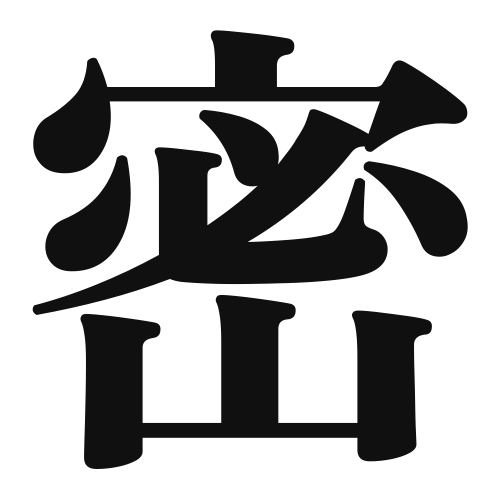1. Overview of Meaning
The kanji “密” (mitsu) means “dense,” “close,” or “secret.” It conveys the idea of something being tightly packed or hidden away, often used in contexts related to secrecy or intimacy.
2. Formation and Radical
The kanji “密” is a phonetic-ideographic character (形声文字), which combines both meaning and sound. The left part, “宀” (roof), suggests a place of shelter, while the right part, “密” (mi), indicates the sound and contributes to the overall meaning of closeness or secrecy.
The radical of “密” is “宀,” which is associated with buildings or structures, reinforcing the idea of something being contained or enclosed.
3. Examples of Usage
Common words and phrases that include “密” are:
- 密閉 (mippei) – airtight
- 密度 (mitsudo) – density
- 秘密 (himitsu) – secret
Example sentence in daily conversation:
「この箱は密閉されています。」 (Kono hako wa mippei sareteimasu.) – “This box is airtight.”
4. Synonyms and Antonyms
Similar kanji with related meanings include:
- 濃 (nō) – meaning “thick” or “strong,” often used in the context of flavors or colors.
- 隠 (in) – meaning “to hide,” which relates to secrecy but focuses more on the act of concealment.
Antonyms include:
- 疎 (so) – meaning “sparse” or “distant,” indicating a lack of closeness or density.
5. Cultural and Historical Background
The kanji “密” has significant relevance in Japanese culture, particularly in contexts involving privacy and confidentiality. It is often used in discussions about personal space and relationships.
Proverbs and idiomatic expressions that include “密” are:
- 「密に連絡を取る」 (Mitsu ni renraku o toru) – “to keep in close contact.”
This reflects the importance of maintaining close relationships in Japanese society.
